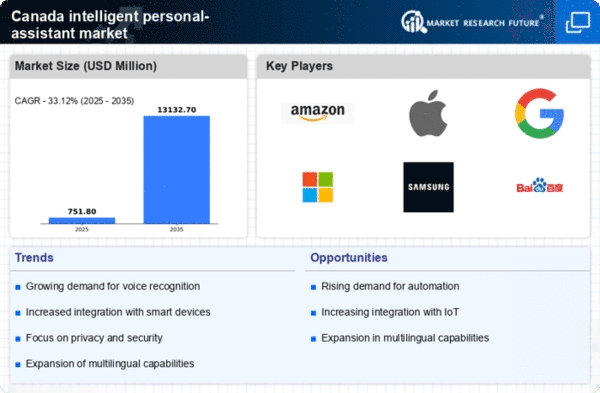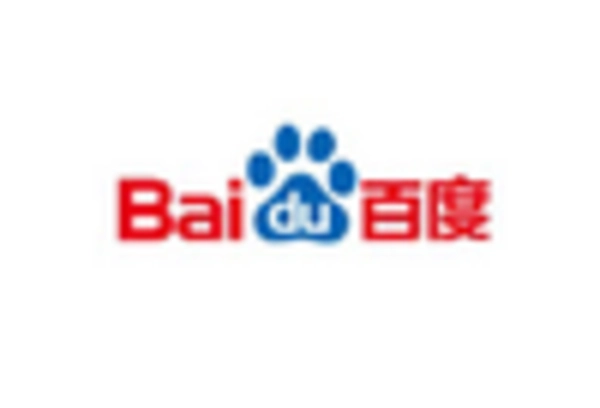Integration with Mobile Applications
The integration of intelligent personal assistants with mobile applications is becoming a pivotal driver in the Canadian market. As mobile device usage continues to rise, the demand for seamless interactions between personal assistants and various applications is increasing. Recent statistics suggest that over 80% of Canadians use smartphones, and many rely on personal assistants for tasks such as scheduling, reminders, and information retrieval. This integration not only enhances user experience but also encourages the development of innovative applications that leverage personal assistant capabilities. Consequently, the intelligent personal-assistant market is likely to witness significant growth as developers focus on creating more interconnected and user-friendly solutions.
Advancements in Artificial Intelligence
The intelligent personal-assistant market in Canada is significantly influenced by advancements in artificial intelligence (AI) technologies. As AI continues to evolve, personal assistants are becoming more capable of understanding context, learning user preferences, and providing personalized responses. Recent developments in machine learning and natural language processing are enhancing the functionality of these assistants, making them more intuitive and user-friendly. This technological evolution is likely to drive market growth, as consumers increasingly seek out intelligent personal assistants that can adapt to their unique needs. The integration of AI into personal assistants is expected to redefine user interactions, leading to a more engaging and efficient experience.
Increased Focus on Multilingual Capabilities
In Canada, the intelligent personal-assistant market is witnessing an increased focus on multilingual capabilities, reflecting the country's diverse linguistic landscape. With approximately 20% of Canadians speaking a language other than English or French at home, there is a growing demand for personal assistants that can understand and respond in multiple languages. This trend is prompting companies to enhance their language processing technologies, thereby broadening their user base. As a result, the intelligent personal-assistant market is expected to expand, catering to a wider audience and improving accessibility for non-English speakers. This focus on inclusivity may also lead to increased user satisfaction and engagement.
Rising Demand for Voice-Activated Technology
The intelligent personal-assistant market in Canada is experiencing a notable surge in demand. This demand is for voice-activated technology. This trend is largely driven by the increasing adoption of smart speakers and voice-controlled devices among consumers. According to recent data, approximately 35% of Canadian households own a smart speaker, which indicates a growing reliance on voice interactions for daily tasks. This shift towards hands-free technology is reshaping how users engage with their devices, leading to enhanced convenience and efficiency. As more Canadians embrace voice-activated solutions, the intelligent personal-assistant market is likely to expand, with companies investing in advanced voice recognition capabilities to meet consumer expectations.
Growing Awareness of Health and Wellness Applications
The intelligent personal-assistant market in Canada is also being driven by a growing awareness of health and wellness applications. As Canadians become more health-conscious, there is an increasing demand for personal assistants that can assist with fitness tracking, medication reminders, and overall wellness management. Recent surveys indicate that nearly 60% of Canadians are interested in using technology to support their health goals. This trend is prompting developers to create specialized applications that integrate with personal assistants, thereby enhancing their utility in health management. Consequently, the intelligent personal-assistant market is likely to see substantial growth as it aligns with the rising consumer focus on health and wellness.
















